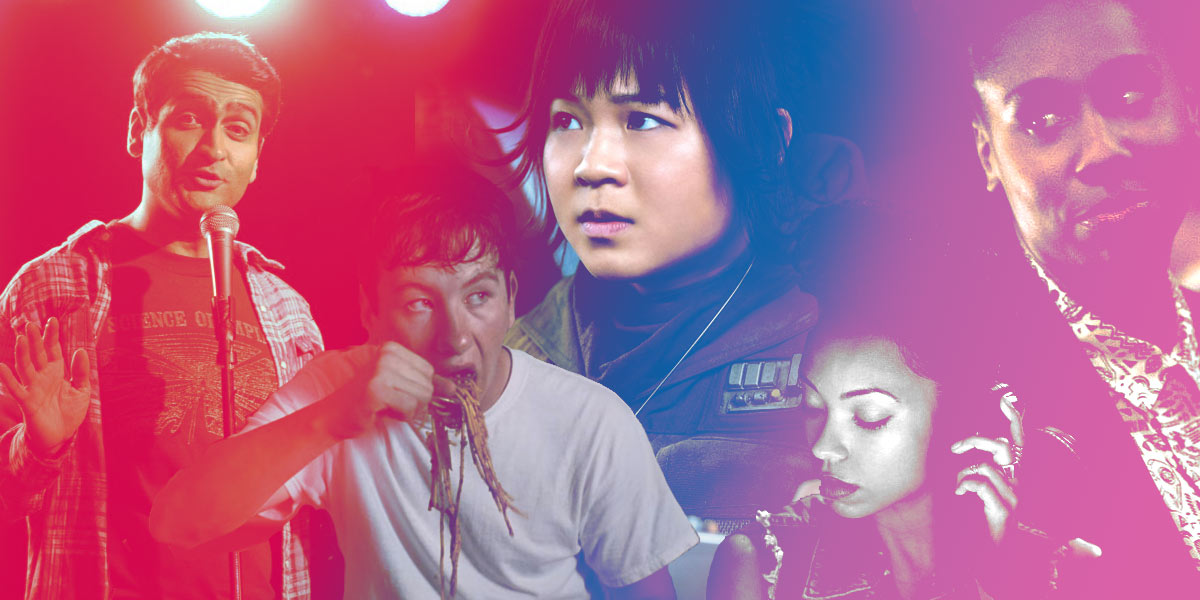 Hong Chau, actor – “Downsizing,” “Big Little Lies”
Hong Chau, actor – “Downsizing,” “Big Little Lies”
After a positive-to-mixed reception at Venice, Alexander Payne‘s fantastical odyssey “Downsizing” has continued to divide, and perhaps its most divisive aspect is the character of Ngoc Lan, a Vietnamese refugee with a wooden leg who speaks in staccato, heavily accented broken English. Yet even the most critical detractors tend to shower praise on the actress playing her: Hong Chau, who also had a showy smaller role in miniseries megahit “Big Little Lies,” a recurring role on “Treme” and a small but memorable part in “Inherent Vice,” is simply the beating heart of the film. In her hands, a difficult, tic-laden role becomes actually the film’s warmest and most relatable, as Ngoc Lan emerges as the story’s moral compass as well as its most endearing and funniest character. Whether we are laughing at her or laughing with her is the sticking point that causes a great deal of the disagreement around this role, but for our money, whether or not Payne intended it, Hong Chau so thoroughly embodies the role that she becomes anything but ridiculous, and in fact reorients the whole narrative around her prickly, idiosyncratic but utterly down-to-earth character.
 Kogonada, writer/director – “Columbus”
Kogonada, writer/director – “Columbus”
Some video essayists are observant admirers of the form, and others, like video essayist turned director, Kogonada, have an uncannily fundamental, preternatural understanding of cinema and its construction. “Columbus,” the directorial debut of this Korean filmmaker, is not only compassionately observed, deceptively simple and brimming with humanity, it is simply astoundingly crafted. Every frame is an exquisite “one perfect shot,” every composition is like a minimalist painting with an innate comprehension of using negative space and the blocking and overall mise en scene is masterful. Moreover, all this wonderful craft is in service or story, character and emotion. Kogonada isn’t just a great academic, he comes out of the gate, fully and beautifully formed.
 Michaela Coel, writer, actor – “Chewing Gum”
Michaela Coel, writer, actor – “Chewing Gum”
Along with Lena Waithe‘s and Issa Rae‘s stateside multi-hyphenate success stories, what’s so gratifying about the emergence of British talent Michaela Coel is that it’s not just as an actor, but as a WOC telling her own idiosyncratic, insightful stories. In the case of “Chewing Gum” those stories are also flat-out bonkers hilarious — weird, brutally honest confessionals that, even though the show is created, written and produced by Coel, even still can barely contain her bristling charisma as a performer. She was briefly glimpsed sitting at a monitor in “Star Wars: The Last Jedi” but will be far more visible in intriguing-sounding Camden Town musical “Been So Long” next year, while we wait for her to deliver her next writing project. That will, by her own choice apparently, not be in the form of “Chewing Gum” season 3 (the first two seasons are available for day-glo bingeing on Netflix now) which is sad news for fans like us, but does mean we get to be genuinely excited for whatever wholly new souffle of bizarre, raunchy and vibrant Coel cooks up next.
 Julia Ducournau, writer, director – “Raw”
Julia Ducournau, writer, director – “Raw”
Though obviously thrillingly different in execution, there’s a surprising amount of DNA shared by French first-time-director Julia Ducournau‘s “Raw” and stateside hit “Get Out,” from (fellow listee) Jordan Peele. Not only are both the work of debut feature writer-directors, but both use horror tropes (the fish-out-of-water; the creepily close-knit family) for the purposes of sociological investigation and both come from a filmmaking perspective that is outside the mainstream. Ducournau’s clever, grisly and provocative “Raw” also joins Jennifer Kent‘s “The Babadook” and 2017 anthology film “XX” in giving voice to a new generation of female horror filmmakers, and like with those films, there is a certain feminist subtext in “Raw.” But really that comes from the way it minutely probes the workings of its female protagonist’s psyche (here it’s an isolated young vegetarian’s grotesque response to the pressure of fitting in in her new veterinarian college environment) rather than any overt political agenda. As Ducournau herself told Rolling Stone “When you make horror, it’s the expression of a form of violence that you feel inside of you – and it’s important we recognize that women feel violence and anger as well.” Here’s hoping we get to experience Ducournau’s violence and anger again very soon.
 Dafne Keen, actor –“ Logan”
Dafne Keen, actor –“ Logan”
Spanish and British actress Dafne Keen barely utters in a word in James Mangold’s excellent subverted super hero Western “Logan,” and it doesn’t matter one bit. With her simmering anger and bitterness bubbling to the surface, we can read Keen— who plays a furious, abused X-23 mutant who just lost her maternal figure— loud and clear. In fact, it’s perhaps a poor decision for the character to finally speak later in the movie, but Keen makes the most of it, using language to express the softer, more empathetic side that emerges in the second half of the movie when she begins to find faith in Logan. Full of rage, in desperate need of connection and paternal love, none of this is spoken aloud in “Logan” and none of it needs to be communicated through words. Like a photo, Keen’s inner emotional intelligence is worth a thousand words.






Jack Dylan Grazer and the Losers Club were huge breakout talents for me this year!!